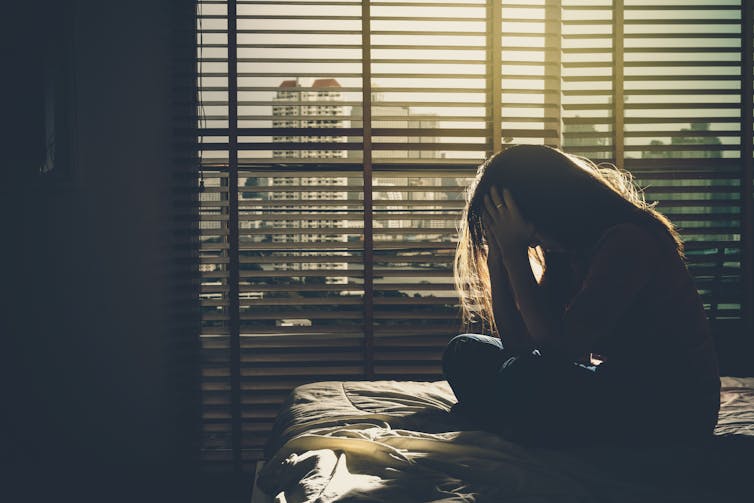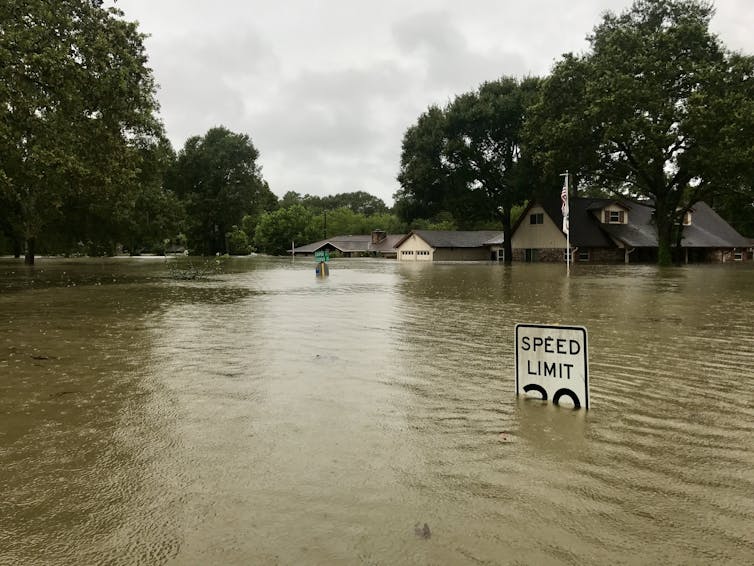how cumulative disasters can harm our health and erode our resilience
- Written by Erin Smith, Associate Professor in Disaster and Emergency Response, School of Medical and Health Sciences, Edith Cowan University
Many of us will be exposed to a disaster in our lifetime. In the past two years alone, Australians have lived through bushfires, floods[1], cyclones[2], and the ongoing COVID-19 pandemic[3].
It’s normal to experience a range of reactions following disaster, such as sadness, anxiety, depression, hyperactivity, irritability or even anger.
The good news is, research tells us[4] most people will recover without the need for professional help. Only a small number of people[5] who experience a disaster will go on to develop long-term mental health problems.
But exposure to more than one disaster can take a unique toll.
Cumulative exposure to disaster
We are now beginning to understand the effects of being exposed to multiple disasters. In the United States, people who experienced both Hurricane Katrina[6] in 2005 and the Deepwater Horizon oil spill[7] in 2010 had significantly increased[8] anxiety and post-traumatic stress disorder (PTSD) than those who experienced only one of the disasters.
Mental health issues were a significant concern[9] after the Deepwater Horizon oil spill; greater levels of disruption to people’s lives, work, family, and social engagement were associated with increased symptoms of anxiety, depression, and post-traumatic stress.
People who had also experienced losses from Hurricane Katrina were highly associated with negative mental health outcomes. Those who experienced both disasters were also more likely to report respiratory illness, heart problems, fatigue, headaches and migraines.
Women who were exposed to both the hurricane and the oil spill and experienced illness or injury because of the hurricane disaster were more likely to[10] have poorer mental health compared to the general population.
Read more: Distress, depression and drug use: young people fear for their future after the bushfires[11]
Meanwhile, New York residents exposed to both the 9/11 attacks[12] and the American Airlines Flight 587 crash[13] that occurred in New York two months later had poorer mental and general health[14] if exposed to both disasters compared to one. This held true for people who experienced direct (including working on the rescue or survivors) or indirect exposure.
What causes this cumulative effect?
One possibility[15] is that experiencing multiple disasters influences our feelings of safety, security, and even our hope for the future, and this increases the negative impact on mental health.
Other research[16] suggests persistent social and economic stress associated with cumulative disaster exposure goes some way to explaining this.
 Research shows people who have been exposed to cumulative disasters have poorer mental and physical health than people who have experienced a single disaster.
Shutterstock[17]
Research shows people who have been exposed to cumulative disasters have poorer mental and physical health than people who have experienced a single disaster.
Shutterstock[17]
Potential biological mechanisms[18] should also be explored.
Mental health symptoms resulting from exposure to one disaster[19] could also increase vulnerability and erode resilience, making us more susceptible to the effects of subsequent disasters.
Read more: Fire, tsunami, pandemic: how to ensure societies learn lessons from disaster – podcast[20]
Will one more disaster ‘push us over the edge?’
Is there a limit to resilience? Is there a point at which one more disaster will push us over the edge?
According to George Bonanno[21], a professor of clinical psychology at Columbia University in New York, there’s very little evidence on this.
And capacity for resilience likely depends on a variety of factors unique to each person and their experience.
Bonanno does, however, make a distinction between one-off traumatic events and chronic stress events. He argues chronic stress events, like the COVID-19 pandemic, wear us out[22]. Over time, our capacity to adapt begins to break down.
 Mental health symptoms resulting from one disaster could increase our vulnerability if we’re faced with another one.
Shutterstock[23]
Mental health symptoms resulting from one disaster could increase our vulnerability if we’re faced with another one.
Shutterstock[23]
Cumulative disaster exposure and inequality
While published research on the effects of cumulative disaster exposure on people from disadvantaged backgrounds is lacking, we do know[24] people who are poorer are more likely live in areas which are more vulnerable to natural disasters, as well as housing types which are less protective against disaster risks.
They also generally have[25] poorer physical and mental health to begin with.
So the burden of cumulative disaster exposure, and its effects on resilience[26], could be worse for people who are disadvantaged.
Read more: You can't talk about disaster risk reduction without talking about inequality[27]
What can we do?
We can help build resilience to the impact of cumulative disasters by improving emotional and material supportive strategies.
Emotional supportive strategies focus on reducing stress and transforming maladaptive behaviours[28] to help reduce emotional, social, and health problems.
Material supportive strategies can include policies providing survivors of disaster with easy and timely access to appropriate resources. We also need mental health policies, plans, and legislation that ensure the care and support of the most vulnerable and marginalised.
This story is part of a series The Conversation is running on the nexus between disaster, disadvantage and resilience. You can read the rest of the stories here[29].
References
- ^ floods (www.aljazeera.com)
- ^ cyclones (knowledge.aidr.org.au)
- ^ COVID-19 pandemic (www.health.gov.au)
- ^ research tells us (pubmed.ncbi.nlm.nih.gov)
- ^ small number of people (www.blackdoginstitute.org.au)
- ^ Hurricane Katrina (www.nationalgeographic.com)
- ^ Deepwater Horizon oil spill (www.nationalgeographic.com)
- ^ significantly increased (www.ncbi.nlm.nih.gov)
- ^ were a significant concern (pubmed.ncbi.nlm.nih.gov)
- ^ were more likely to (pubmed.ncbi.nlm.nih.gov)
- ^ Distress, depression and drug use: young people fear for their future after the bushfires (theconversation.com)
- ^ 9/11 attacks (www.history.com)
- ^ American Airlines Flight 587 crash (www.theatlantic.com)
- ^ had poorer mental and general health (pubmed.ncbi.nlm.nih.gov)
- ^ One possibility (www.ncbi.nlm.nih.gov)
- ^ Other research (pubmed.ncbi.nlm.nih.gov)
- ^ Shutterstock (www.shutterstock.com)
- ^ Potential biological mechanisms (pubmed.ncbi.nlm.nih.gov)
- ^ resulting from exposure to one disaster (pubmed.ncbi.nlm.nih.gov)
- ^ Fire, tsunami, pandemic: how to ensure societies learn lessons from disaster – podcast (theconversation.com)
- ^ George Bonanno (www.researchgate.net)
- ^ wear us out (www.theguardian.com)
- ^ Shutterstock (www.shutterstock.com)
- ^ we do know (www.samhsa.gov)
- ^ generally have (www.ncbi.nlm.nih.gov)
- ^ effects on resilience (www.irishtimes.com)
- ^ You can't talk about disaster risk reduction without talking about inequality (theconversation.com)
- ^ maladaptive behaviours (www.healthline.com)
- ^ here (theconversation.com)

















